For the past few months, City Limits has sought out New Yorkers in unique living arrangements to find out why they live where they live. We homed in on three people, all Bronx residents, with three very different accommodations: an old RV, a two-story houseboat and a room in a spartan warehouse.
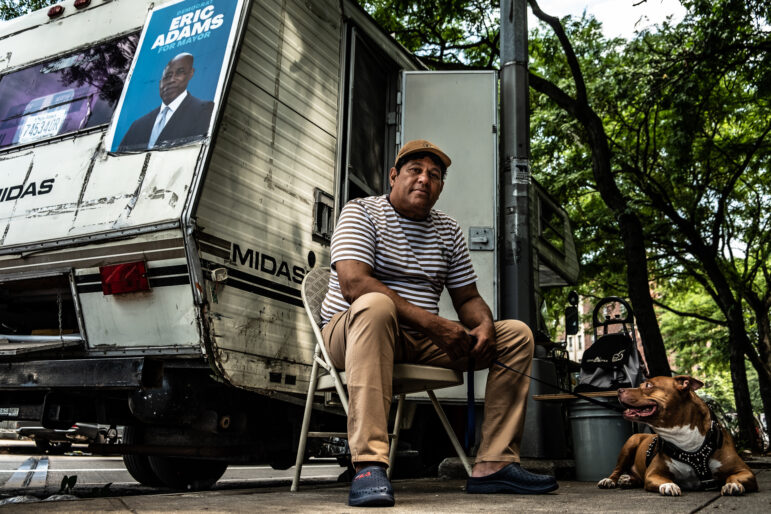
Adi Talwar
Egiberto Adames in July sitting next to his RV with his dog Arewin on Gerard Avenue in the Bronx.Vans and motorhomes dot our industrial streets. Houseboats bob in creeks and bays. And cash-strapped creators continue to turn to warehouses and studios for cheap accommodations.
New Yorkers are often forced to get creative when it comes to housing. Blame rising rents, out-of-control home sale prices and the limited availability fueling the city’s housing crisis.
For the past few months, City Limits has sought out New Yorkers in unique living arrangements to find out why they live where they live. We homed in on three people, all Bronx residents, with three very different accommodations: an old RV, a two-story houseboat and a room in a spartan warehouse. All three said they could not afford the kinds of homes they truly wanted, whether it’s an oceanside cottage or a simple studio apartment. It’s a sentiment most New Yorkers can relate to.
But their situations diverge from there. While one man lives in relative comfort, another is effectively homeless. The third opted to give up his place to pour his money and energy into his business.
Here are their experiences.
NYC’s coziest home—for nine months of the year
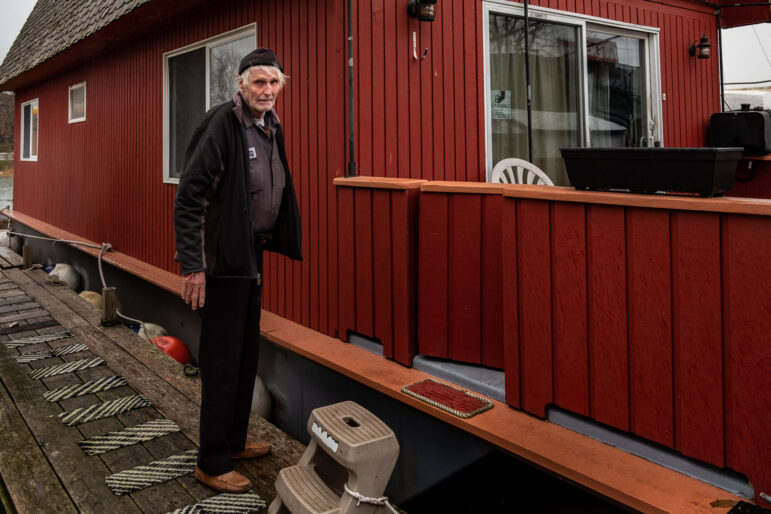
Adi Talwar
Robert Johnson, 86, standing by the houseboat on which he has lived for 41 years.
Robert Johnson has a favorite saying he returns to whenever he’s describing the salty stubbornness, the creativity or the eccentric intelligence of sailors.
“You can put six people with some serious sailing experience together and you get six different opinions on how to sail a boat,” he says. “And the funny thing is, they’re not all wrong.”
Whatever their opinions, all six would probably agree on one thing: Johnson, 86, knows boats. And they might agree on this too: “Anyone who lives on a boat in the winter needs his head examined,” Johnson said as he sat inside his living room on a frigid Thursday afternoon in December. “The boat is very nice nine months of the year. The other three months, you’d give anything to be anywhere else.”
Yet here he is, loading up the firewood and heating fuel, preparing to chop ice with a crowbar and hunkering down for a 41st winter on the houseboat he purchased in 1982 and turned into one of New York City’s coziest abodes.
Classical music fills the living room and a fuel-powered radiator pumps warm air through the home as rain pummels the bobbing deck. Two elegant, wood-burning fireplaces remain in place in case of a winter emergency.
There are tendrils of philodendron dangling from wooden ceiling beams, a telescope pointing to the northeast sky and all around, boats: Models of famous vessels, like the Atlantic, once the world’s fastest schooner, and Zaca, a yacht owned by Errol Flynn that Johnson said he once tried to buy; a gorgeous image of billowing sails by famed yacht photographer Morris Rosenfeld; illustrations by City Island’s resident artist Mark Whitcombe; bookshelves lined with novels about life on the seas and a folder filled with photos of Johnson and friends sailing on Long Island Sound.
It’s all tucked away on a creek, down a series of slick gangways, between an industrial business zone and a highway Shell station. Johnson said it’s far from an ideal location, but it is what he could afford and where he has come to feel comfortable.
“I couldn’t find a house,” Johnson said. “I went all over City Island and I tried to buy a number of cottages, but I couldn’t find anything, anywhere worth spending on. And the prices now are even worse.”
He said his dream would be a waterfront cottage in Florida. “But that ain’t going to happen,” he said. “The prices are astronomical.”
Johnson said he used to own a trucking business but lost his license to operate and had to shut down in the 1980s. He offloaded his properties in Florida and the Bahamas and decided to stay on a houseboat in City Island, at first taking on roommates to help cover the mortgage and the marina rent. He found he preferred to live alone. “They weren’t boat people,” he said.
When the site was sold to make way for a restaurant, Johnson had the boat towed to its current location in The Bronx—he asked to keep the specific site a secret because he didn’t want problems with the landlord. He said he pays $1,000 a month in rent, relies on electricity from the marina and gets his water from a garden hose attached to an outdoor bib prone to freezing.
He said he has thought about checking out other locations, including a “liveaboard” community near Floyd Bennett Field in Marine Park, but his friends, doctors and favorite diner are close by.
There are about a dozen boats moored at the Marina, with six occupied full-time, he said. One is owned by a Westchester real estate broker who started renting it out on Airbnb, until a group of partiers trashed it, he said.
“One or two of them have some experience,” with boats, he said of his neighbors. “The others, it was the cheapest place to rent.”
New York City imposes few special rules on liveaboards like Johnson’s. The city’s housing, buildings and small business agencies said they had no requirements. In 2018, there were 36 slips with residential permits, including a handful of Hudson River sites. Marinas are typically owned by the Parks Department, New York City Economic Development Corporation or private landlords.
Some of those landlords are more knowledgeable than others, Johnson said. As Hurricane Sandy approached, the marina owner at the time managed to bring two tugboats into the waterway and lash all the liveaboards together to keep them from floating away as the tide rose to street level. “That was unbelievable seamanship. It really, really impressed me,” he said.
When City Limits first visited Johnson in September, he was sharing a beer with a neighbor. He said the other owners are a good group and will lend a hand if needed.
Fortunately for them, Johnson is also available for instruction. He is an encyclopedia of sailing information and nautical history, which he is quick to share, and patiently explain to even the most hopeless landlubber (Editor’s note: this reporter).
“I’ve been around boats since I was seven years old. That gives me 79 years of experience,” he said. “Believe it or not, I actually learned a little bit.”
His mother was a concert pianist and his father, a commercial mortgage broker who settled in Nassau County and bought a boat that they frequently sailed around Long Island Sound, he said. One day, when Johnson was 7, they got caught in a gale that forced them to seek safe harbor at City Island.
There, Johnon said, he encountered “a gorgeous, gorgeous schooner” called Atlantic, years later the subject of an acclaimed 2002 book.
“It took my breath away, he said, saying the experience left him “hooked for life.”
Since then, Johnson has always lived near, or on, the water, aside from a grueling stint at an Army base in Colorado in 1955. “I went absolutely berserk,” he said. “It tore me up. It got so bad that I was smelling saltwater in my dreams.”
Johnson vowed to stick close to the coast.
“If you’re out there on the right day with the right people I can’t imagine any drug that could ever get you high like that,” he said. “I’ve had moments I would pay $100 million to repeat and the only people who will understand that are the insane people like me.”
The precarity of RV living
An old RV sat parked on a Gerard Avenue overpass for eight months. And there, on the back, was Eric Adams.
The vehicle’s owner, Egiberto Adames, pasted a large poster of the mayor on his 1978 GMC Midas motorhome ahead of last year’s election to help get out the vote, he said. After Adams’ win, Adames said he parked the motorhome on the relatively quiet roadway, near a park overlooking the Metro-North tracks. He remained a fan.
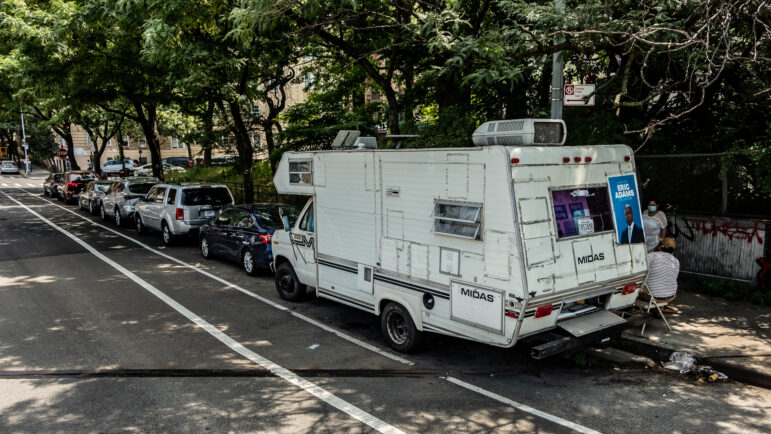
Adi Talwar
Egiberto Adames’ RV parked on Gerard Avenue near 153rd Street in the Bronx in July.
“I think he’s doing a good job,” Adames told City Limits in Spanish on July 12. “He’s just starting and he was police and has experience in the streets and I think he will do a good job.”
Safe streets are pretty important to Adames, an immigrant from the Dominican Republican who lived in the RV with his dog Arewin. The 10-year-old pit mix was his “alarm” in case of intruders, he said. Not that there were many. He said few people traverse the overpass and he rarely encountered problems, aside from a vandal who threw a chunk of concrete into his windshield while he was away and a traffic enforcement agent who ticketed him for an expired registration.
A man who washed cars down the street kept watch whenever Adames left the area and even alerted him that a reporter had left him a note a few days earlier, he said.
Adames, 61, said he decided to purchase the motorhome in 2020, after construction jobs dried up during the peak of the pandemic and he could no longer afford an apartment in Philadelphia, where he had spent the previous two years. He moved back to The Bronx, his former home borough, and bought the RV from a guy in Yonkers for $5,000. He parked it near his cousin’s apartment on Gerard Avenue in November 2021.
The motorhome had 96,000 miles on it, and started with no problem when Adames turned the key. But just eight days later, the precarity of life in an RV—and perhaps, the impact of the mayor’s commitment to cleaning up the streets—became apparent.
Adames called to say that the city had ordered him to clear out. He said that because his windshield was shattered, he planned to hire someone to tow him to a new location, possibly near a friend with an RV in East Harlem.
After that, Adames became hard to reach. He received two more $75 alternate side parking tickets at the same location in late July, records show. The next month, he texted to say he had an “economic problem” and didn’t have enough money. He stopped responding to texts, and his two phones are now out of service.
Adames said he made a few bucks working on campaigns for city and state office, including Manhattan City Council candidate Thomas León (campaign finance records show León paid him $600), Bronx Council candidate Altagracia Soldevilla ($300) and Bronx Borough president Samuel Ravelo ($200).
Most recently, he said, he had worked on behalf of Bronx Assembly candidate Emmanuel Martinez, whose longshot bid mysteriously drew big bucks from a Wall Street-backed independent expenditure. A consultant hired by the SuperPAC Moving Forward NY, Martha Ayon, said she and her field director had no record of Adames. Martinez has not filed a financial disclosure report with the state’s Board of Elections since January and did not respond to messages seeking comment.
Adames said he hoped to land more campaign work so he could afford an apartment, or even a bigger RV. But he put a positive spin on a difficult living situation.
“If you have an apartment, you’re stuck,” he said. “If you want to take a vacation you have to pay, but if you have an RV you can go anywhere.”
The sidewalk next to the vehicle hinted at its permanence. A broom leaned against a post, an ice-filled cooler sat on the ground next to a small table and a grill. An extension cord led from an outlet in the light pole into the cramped vehicle, allowing Adames to watch movies on the TV next to his stove.
A curtain separated the cab from the tight living quarters, and he placed large signs from an early pandemic social distancing and masking campaign in the windows for some privacy. Adames said he picked them up after workers at a nearby park discarded them
The cramped vehicle contained a stove, two beds and a tiny bathroom. He said he periodically paid a company $65 per visit to clear out the holding tank.
To shower, he visited his cousin Rosa’s apartment up the street. “I wish he would get an apartment. It’s more comfortable,” Rosa said. “But that’s him.”
Adames laughed and chimed in with his “philosophy of life.”
“You have to be prepared to live in whatever situation you’re handed when it’s handed to you,” he said. “I would love to have a palace, but it turns out I have an RV.”
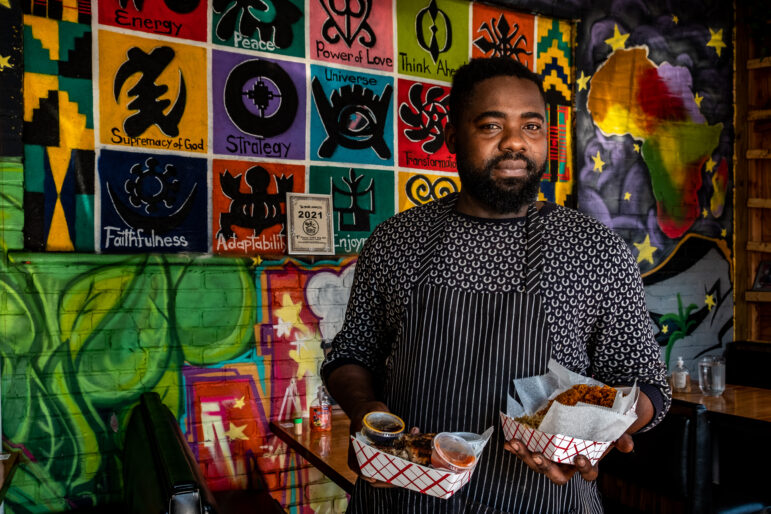
Adi Talwar
Chef Big Mo Co-owner of OSU R.E. Grill located at 490 Hunts Point Avenue.
A warehouse and a dream
Growing up in Ghana, Chef Bigmo was surrounded by restaurateurs. His mother owned an eatery. So did his aunt. Five of his sisters worked in the food industry. But Bigmo, who studied marketing and won a visa lottery to come to the U.S. in 2011, never imagined he’d follow that path.
Today, he crashes in a Bronx industrial zone, next to a restaurant he built from the ground up three years ago.
Osu.re Grill on Hunts Point Avenue serves a mix of Ghanaian, West Indian and American dishes to laborers leaving the massive Food Distribution Center down the street. Hunts Point locals and West African immigrants who have made their home in The Bronx also frequent the restaurant.
Chef Bigmo—he declined to go by any other name—said he started smoking meats under an umbrella on the sidewalk three years ago, just before the pandemic hit New York. Before that, he had honed his skills as a chef in several nursing home and hospital kitchens. As his customer base grew, Bigmo and his brother took advantage of relaxed COVID-era outdoor dining rules to build an enclosed wooden structure, now complete with WiFi and a heating system, next to a warehouse owned by a business partner.
Bigmo, 39, then began hiring kitchen staff to meet the demand for his marinated fish, jerk chicken and fried rice. Osu.re has six employees who cook, clean, serve and handle takeout orders from four delivery apps, including GrubHub and AfricanDishout.
“After all the hard work and all the stress we go through in New York, I believe that everyone deserves to eat good,” Bigmo said as he held a heaping plate of shitor loo—a mackerel dish— with corn-based banku and kenkey. “This is a place that everyone should come to. It’s a home away from home.”
And for Bigmo, that’s quite literally true.
Last spring, he found he was spending all of his money, time and energy on the restaurant. The $850 a month he paid for a studio on Gun Hill Road in the northeast section of The Bronx was cash he would rather use to cover staff wages and monthly internet bills, not to mention turkey and tilapia from the Hunts Point markets and his $2,400 monthly lease for the eatery.
So Chef Big Mo ditched his apartment last summer and started crashing on a mattress in a spartan room inside a nearby warehouse.
“In order for the restaurant to succeed I couldn’t afford to pay that rent and still pay the rent on the restaurant, so I gave it up,” he said.
The arrangement stinks, he admitted, but he is willing to make the sacrifice to pursue his passion with an eye to the future.
“It’s rough at the end of the day, because this place is not really meant for living, but it’s a sacrifice I have to do in order for the restaurant to be where I want it to be,” he said. “It’s a lot of commitment. It’s a lot of sacrifice.”
He said he is looking forward to another busy spring and summer that will allow him to pay off the restaurant’s new heating and cooling system and its remodeled bathroom. Only then will he feel comfortable renting an apartment again, preferably one in Hunts Point, he said.
“My workers make more money than I do now because I’m not paying myself,” he said. “But at the end of the day we are looking at the long term.”


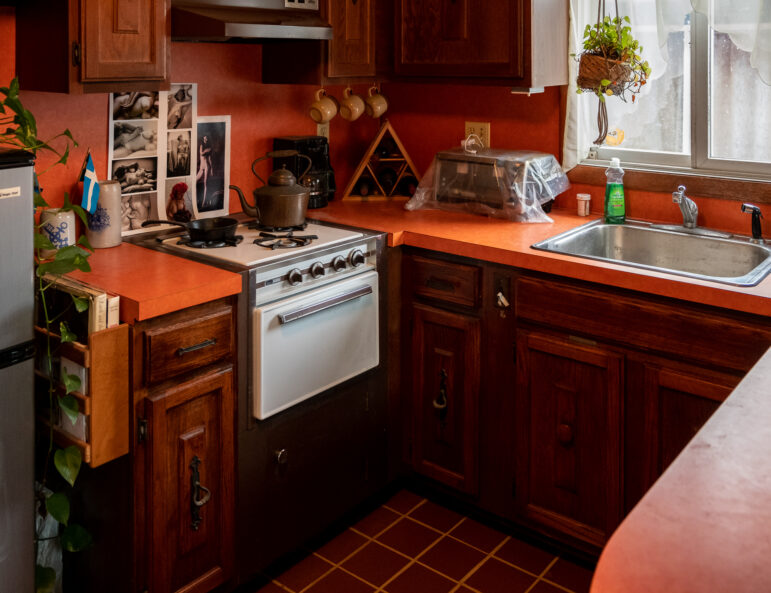
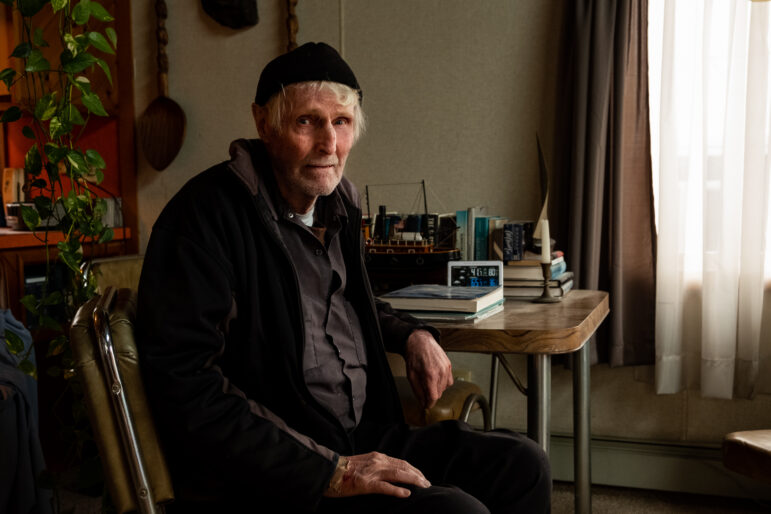
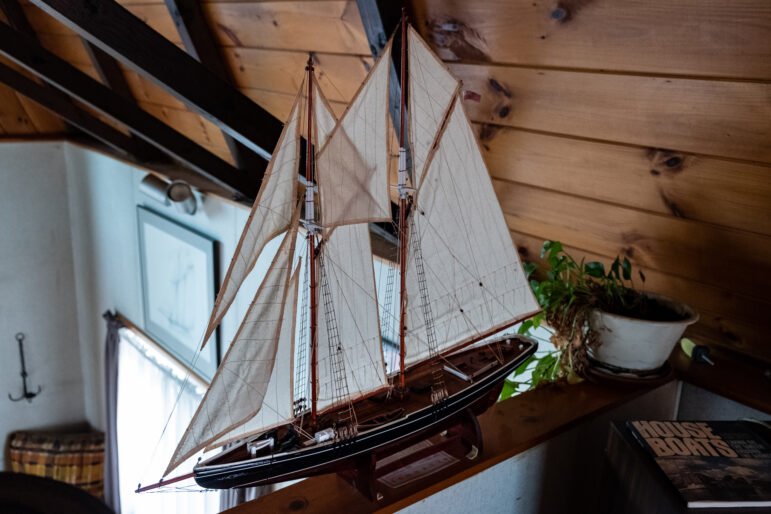
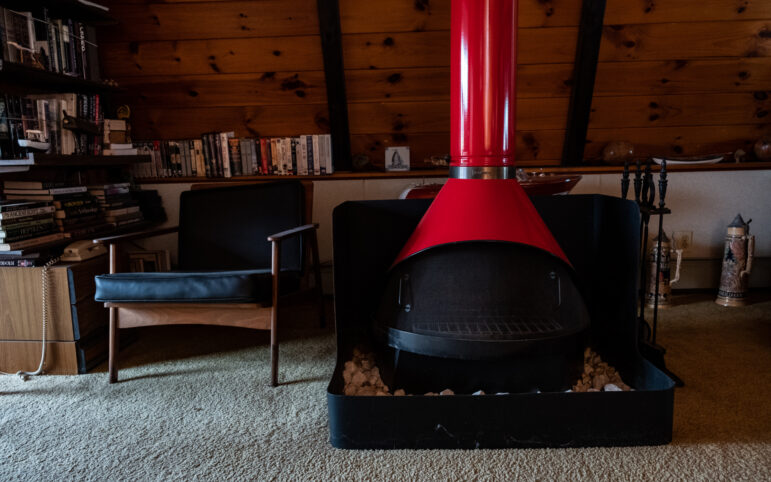
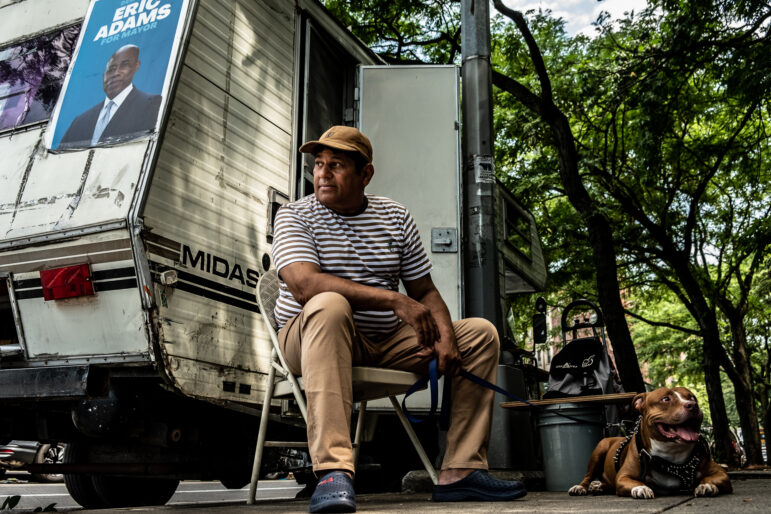
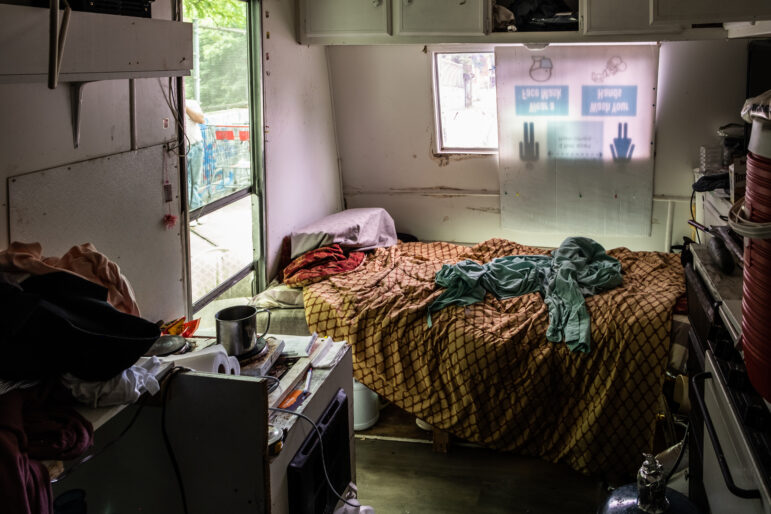
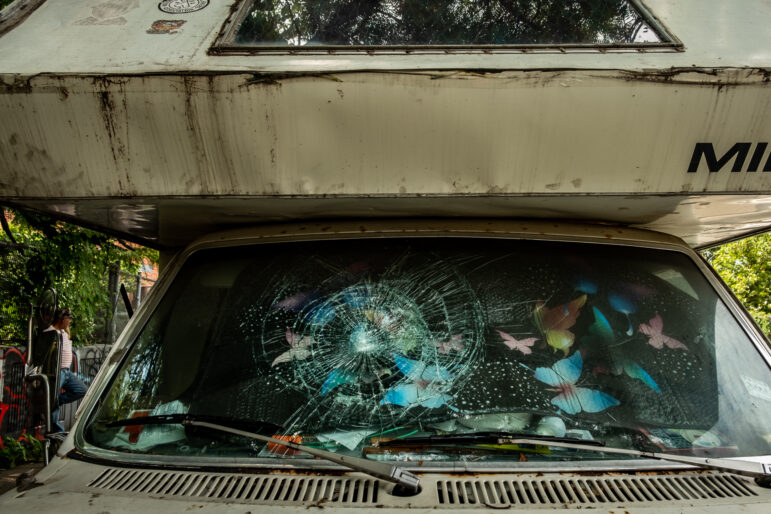
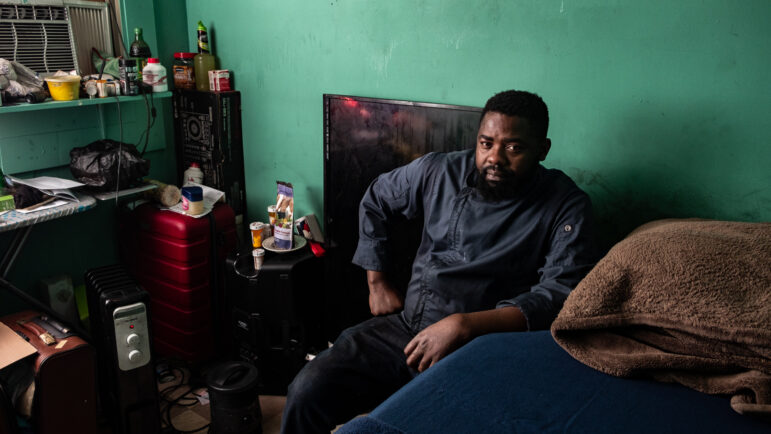
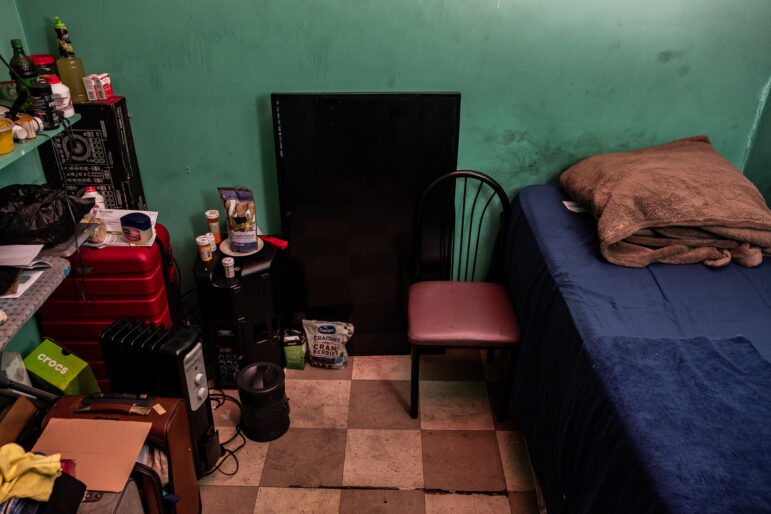



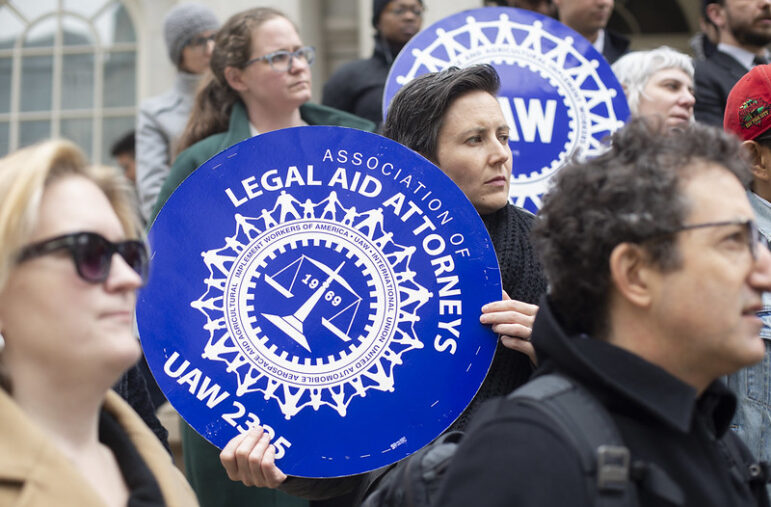
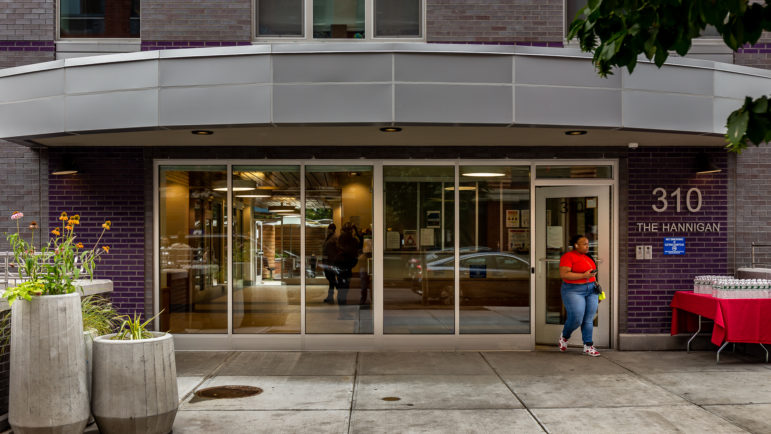


One thought on “In Housing Crunch, Some New Yorkers Turn to Unique Accommodations ”
It is incredibly challenging to find a decent place to live and the Bronx used to be “the affordable” borough. Part of the problem is the lack of small, safe affordable efficiency units as they used to be known and Rooms for rent, the working class Single Room Occupancy (SRO) hotels. I think it may have been under Mayor Lindsay, the administration considered the SRO substandard, but it was a great option for a lot of NYers.
https://academicworks.cuny.edu/cgi/viewcontent.cgi?article=1344&context=clr